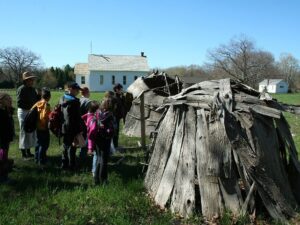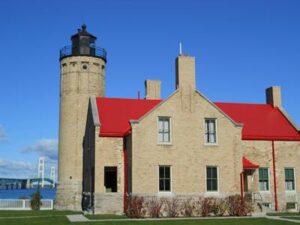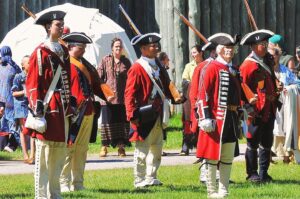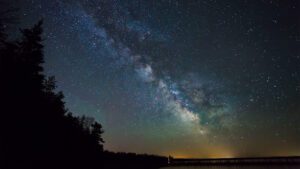Northern Michigan Guides Stock Photo
It is not as famous as the Plymouth Rock but it has been used as a navigational tool since before the Pilgrims landed. This massive boulder is McGulpin Rock, near Mackinaw City in Northern Michigan. In 1615, French explorers noted the huge rock near the Straits of Mackinaw. One of the explorers in the expedition was the man believed to be the first European to cross each of the Great Lakes, Etienne Brule.
Plymouth Rock in Massachusetts was where Pilgrims landed in 1620, five years after Brule made note of McGulpin Rock. Brule’s explorers reported that the rock was used by Native American tribes as both a navigational tool and to measure the cyclical changes in the depths of the Great Lakes.
McGulpin Rock is big- more than 10 times bigger than Plymouth Rock. It’s nine feet tall and weighs in at 54 tons compared to the tinier Plymouth Rock’s five tons. McGulpin Rock is right on the shore of Lake Michigan with majestic views of the Mackinac Bridge and the Straits of Mackinaw.
The huge rock is located down the hillside from McGulpin Point Lighthouse, just outside Mackinaw City. McGulpin Rock can be accessed by walking down the path behind the lighthouse or driving down the road just outside the entrance to the lighthouse.
McGulpin Lighthouse is open to the public and can be toured- including a climb to the top of the tower on the spiral staircase.
500 Headlands Rd., Mackinaw City, MI, 49701
(231) 436-5860

Mackinaw City’s Heritage Village lets visitors explore life in the Straits of Mackinac as it was during the era of 1880-1917.

With Lake Michigan on one side and Lake Huron on the other side, Mackinaw City is a true Great Lake’s spot with lots of things to do!

With Lake Michigan on one side and Lake Huron on the other side, Mackinaw City is a true Great Lake’s spot with lots of things to do!

While it may be the gateway to Mackinac Island, Mackinaw City offers it’s own set of awesome festivals and events.

The history of the fur trade in Northern Michigan is captured at Colonial Michilimackinac in Mackinaw City.

The Headlands, just west of Mackinaw City, is one of six International Dark Sky Parks in the U.S. and one of nine in the world.